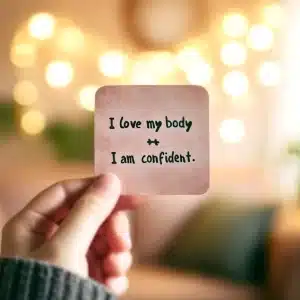Body image is a complex concept that encompasses many aspects, from your skin, ears, and teeth to your face and weight. Not everyone with a body image problem shares the same issues as someone else with body image problems. It boils down to your perception of yourself, whether it’s your body as a whole or a specific part.
Body image can be understood through four key aspects:
- Affective: How you feel about your body image. You can like parts of your body while disliking other parts.
- Behavioral: How you behave in response to your body image. For someone with issues around weight, they may restrict their eating, choose cosmetic procedures, or work out more.
- Cognitive: How you think about yourself. If you constantly criticize a specific part of your body or are preoccupied with how it looks, you might believe, for example, that you would be more successful in attracting your desired partner if you were thinner or that you’d have more friends if you were in better shape.
- Perceptual: How you see yourself body image-wise. Your perception may not always align with reality; for example, you might see yourself as overweight in the mirror when, in fact, you are thin.

Body Image Problems
It’s never black and white because most people have some form of body acceptance. There are three different types: liberation, neutrality, and positivity. Body liberation is the recognition that everyone comes in all different shapes and sizes, and that’s fine. Body neutrality doesn’t focus on judging bodies at all. Body positivity is accepting your body as it is always and feeling confident and comfortable.

In comparison, the idea of body dissatisfaction or negative body image revolves around negative feelings and thoughts about your body. This dissatisfaction is generally distorted; it’s not really what you look like, and your mind has exaggerated it because you’re struggling. Women are more likely to have a negative body image, but that doesn’t mean men are immune.
Mental Health
Body image issues run much deeper than just how you perceive your body; they can significantly impact your mental health. By speaking poorly of your body, you are tearing yourself down, which impacts your self-confidence and self-esteem, and ultimately, your mental health.
More problems arise if you don’t have a positive body image. It can lead to anxiety and depression, eating disorders, body dysmorphia, emotional eating, negative self-talk, low self-esteem, lack of self-confidence, and all of that can spiral into shame and guilt.
Many people deal with unhappiness and shame as a result of their negative body image. When social media and the media, in general, constantly point out perceived flaws, this can lead to increasingly anxious thoughts if you believe you have these perceived flaws. Maybe you’re worried about others judging your body, so you wear a t-shirt to go swimming or refuse to go swimming altogether. It can impact your life in so many ways.
Improving Your Body Image
So, do you focus on your mental health to improve your body image or improve your body image to improve your mental health?
You can do both, but in the meantime, there are steps you can take to improve your body image. It starts by recognizing the triggers that bring on negative feelings and thoughts about your body. Explore those heavy emotions to identify the source and invite compassion instead of criticism.
As difficult as it is, you need to resist the desire to make comparisons between yourself and others. If this is something you truly struggle with, take a social media break as you start the journey. You can return when you’re a little stronger, but there’s a good chance it’s feeding into your spiral right now.

You can also remind yourself daily how much good your body does for you. It carries you through every task, it dances, it makes love, it cares for you and others, and it allows you to nurture… focus on the positive things about your body to start improving your body image right now.

Struggling with body image issues can take a significant toll on your mental health, but you don’t have to navigate this journey alone. At Gaia Counselling, we offer compassionate, personalized support to help you improve your body image and enhance your mental well-being. Book a session today or reach out to learn more about our holistic approach to mental health care. Let’s work together to build a more positive and confident you.




